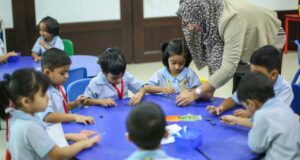How often do you feel your child is not paying attention to what you say? How often do you wonder if they listen to you only when they want to? Almost always, isn’t it? It is one of the most common traits exhibited by children and experienced by parents worldwide.
So, why do children not listen actively when they should? And, what is active listening?
What is Active Listening?
Active listening is paying attention to the speaker and understanding the message they wish to convey. The importance of active listening skills is that these help the child to be a good communicator. Paying attention while someone speaks is also a sign of good conduct and good character.
What are Active Listening Skills for Children?
Just like adults, there are active listening skills for children, too. These skills teach them to make a conscious effort to hear what is being said and what are the feelings being communicated. Some of the active listening skills developed during primary schooling are:
● Paying attention,
● Use body language to show you are listening,
● Responding appropriately,
● Asking questions at the end,
● Not interrupting when the speaker is communicating.
What are the 3 A’s of Active Listening?
Listening is different from hearing. It is a conscious activity that requires the 3 A’s:
● Attitude
● Attention
● Adjustment
Why is Active Listening Important?
Active listening is an essential element of the communication skills necessary for socialization. It is important as it helps children comprehend what is being said and commit it to memory. It also helps children become better problem-solvers.
Active listening helps improve children’s vocabulary, creativity, and imagination, too. As active listening helps children socialize, it builds team spirit and leadership skills, as well.
Passive Listening vs Active Listening
Passive listening is when your child isn’t paying attention to what is being said. They aren’t able to retain the information because they are distracted. And, active listening is when your child listens carefully to understand what you are saying to them.
As children are so full of energy and curiosity, they continuously imbibe a lot of information. It often leads to confusion about the things that they should retain and things they should let go of.
It is, therefore, important to help cultivate active listening skills from a young age as children are impressionable and more receptive.
How do you Develop Active Listening Skills in Children?
To help children develop active listening skills, the elders themselves must display the qualities of good listeners.
Parents or teachers must show the children how one should listen attentively, maintain eye contact, participate in the conversation, and ask questions at the end, without interrupting.
This will help children develop active listening as a lifelong habit and use it to become good communicators.
5 Tips to Improve Your Child’s Active Listening Skills
We share with you some simple active listening tips to help your child practice active listening. We also share some fun activities to improve listening skills. You can engage in these along with your children to help improve their listening and be more attentive.
1. Be a Good Listener
For your child to become a good listener, you need to be a good listener, yourself. This is because children learn from examples. Paying attention to someone when they speak means giving that person the respect they deserve.
It’s, therefore, crucial that when your child tries to communicate with you, you give them your full attention without interrupting them. Avoid assuming their thoughts, or guessing, as that can have a negative impact.
2. Maintain Eye Contact
Maintaining eye contact when communicating or listening to someone, is considered respectful. It not only makes you a sociable person but also helps in effective communication. It also helps you focus on and understand what the speaker is saying.
3. Ask Questions
The best way to know if you have heard and understood what the speaker is saying, is to ask questions. This also shows the speaker that you have been listening with attention to what is being said. Encourage children to ask questions, but after you have finished speaking.
4. Repeat What Has Been Said
Repeat what has been said to you but in your own words. This helps the speaker understand if you have understood them perfectly. It also helps them correct you if you have made any mistakes in understanding the matter.
5. Listen to Understand the Context
Listening carefully helps understand not only the message, but also the context, or the underlying feeling in the message. At times, the emotions in the message carry more meaning than the message itself.
Active listening helps children learn to pay minute attention to what is being said and what is being conveyed.
Also Read: Moral Values for Students
Active Listening Activities For Students
The following activities help develop the active listening skills of children in a relaxed atmosphere.
1. Listen to Audiobooks
Listening to stories in audiobooks is a great way to encourage your child to develop their listening skills.
Develop it into an everyday activity that you participate in along with your child. To ensure your child is paying attention, you could pause the story midway to discuss the events unfolding in the story.
2. Read Together
Besides listening to stories on audiobooks, you could read books together, too. During the reading, pause every once in a while to ask them what they liked the most about the story or if they agree with the characters of the story, or how they think the story would end. This will ensure your child listens carefully while you read the book.
It will also encourage them to think creatively and develop their imagination. Teachers at the Indian school Muroor help develop the reading habit in students, where they are encouraged to listen to the story and share their feelings about it or repeat the story to their friends.
3. The Telephone Game
It’s a simple game where the entire family or group of students can participate by sitting in a circle and creating a story.
Every member contributes a sentence to the story. This helps build your child’s vocabulary, creative thinking skills, and also listening skills. It helps them develop their imagination, too.
4. ‘Work’ with Your Child
Activities, such as gardening, sewing, baking, cooking, etc, also encourage active listening. This is because your child will have to pay attention while you give them directions for these activities!
Isn’t this a fun way of helping children develop their listening skills?
5. Simon Says
A game commonly played in kindergarten and primary schools, requires children to be attentive when the teacher gives directions. They need to learn the name Simon and listen carefully to what he wants the children to do.
For example, “Simon says, shake hands with the child in the green shirt.” A fun game, it is sure to encourage children to listen actively.
What are the Benefits of Active Listening?
Active listening is important for children to help them become better at communicating their thoughts. Besides this, the other benefits of active learning are
● Better productivity and memory recall,
● Lesser misunderstandings,
● Improved self-esteem,
● Greater self-reliance,
● Improved social behavior,
● Better problem-solving.





























